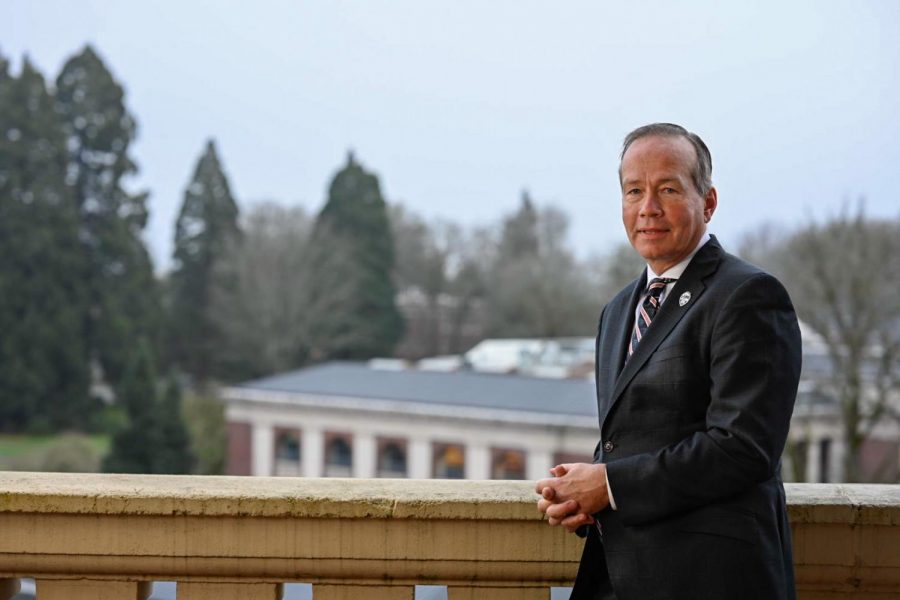New OSU president addresses past controversy, pandemic, Black Lives Matter movement
July 28, 2020
In a time of change, Oregon State University is going through its own, as president emeritus Ed Ray stepped down from his position of 17 years, and F. King Alexander begins his first term as OSU’s new president.
Alexander previously spent seven years at Louisiana State University, where he served as an educational advisor for the U.S. Senate during the Obama Administration, working on the college scorecard. Prior to his time at LSU, Alexander served as president of California State University, Long Beach and Murray State University.
“Everywhere I’ve been I’ve tried to stabilize tuition and fees, and fight for state appropriations [to] make sure our legislatures throughout the nation aren’t abandoning their commitment to students, which is what I’m worried about,” Alexander said.
These commitments to students included Alexander’s participation in creating a student loan default rate for colleges and universities that sanctions schools if 30% of students default, causing for-profit universities to lose federal funding.
Although Alexander was popular among California students, winning two ‘President of the Year’ awards, his presidency at LSU was met with controversy.
“King Alexander was not especially popular at LSU or among faculty,” said Kevin Cope, former faculty senate member at LSU. “He ran a buttoned-up shop in the LSU System office with very few faculty advisors and with only occasional forays into venues where faculty could launch serious questions.”
The most notable controversy that arose during Alexander’s era was the firing of a female professor for sexual harassment, after using lewd language in a class amongst students.
The professor of education, Teresa Buchanan, filed a civil suit against Alexander and other LSU administrators included in the decision of her termination, stating that the firing was unconstitutional. Buchanan’s claims were thrown out by U.S. District Court Judge, Shelly D. Dick, who sided with Alexander and other university officials.
“Her claim was that she was removed because she cursed in class, that was not the case at all,” Alexander said. “She had created a hostile learning environment that [meant] we could not even put her back into the classroom because of the liability associated.”
According to Cope, who served on the faculty senate at the time of professor Buchanan’s investigation, the panel had recommended Buchanan’s continuation at LSU, given that she would attend counseling sessions. Whereas, Alexander said he gave Buchanan the option to conduct research until her retirement two years following the incident, which she declined.
“Independently and on his own authority, King Alexander rejected the panel recommendation and, contrary to the will of the faculty, dismissed Professor Buchanan,” said Cope in an email statement. “This behavior in turn led to a unanimous censure of King Alexander by the LSU Faculty Senate as well as further investigations by the the American Association of University Professors, which had already both censured LSU and then reiterated that censure a second time.”
Alexander said his ruling had nothing to do with gender, and if a similar situation arose at OSU, he would ensure the same outcome.
“Dr. Alexander demonstrated the authentic leadership qualities, significant experience at a research-intensive institution, and record of successfully advancing inclusive excellence that the Board was seeking,” OSU’s Faculty Senate Board Secretary Debbie Colbert said in an email, despite Alexander’s history at LSU.
According to Colbert, included in the experience that the faculty senate found particularly impressive was Alexander’s involvement with the success of underrepresented students at LSU. In 2015, LSU received a record number of Black and Latinx graduates, while also becoming the top university in the nation granting Ph.D.s to women and underrepresented minority groups.
In the first six months of 2020 alone, the Black Lives Matter organization has risen in its impact and a large momentum of OSU students are following the movement and advocating for change amongst OSU’s diversity of faculty and students.
In comparison, Alexander mentioned the killing of Alton Sterling, a Black man from Baton Rouge who was killed selling CD’s in 2016, and the outcry from students and faculty at LSU.
“We took a pause in the fall, and this was an election year, [but] we took two full days, brought in experts from everywhere… and we spent two days just talking about racism in America,” Alexander said. “Whatever we do, I’d just like to keep this conversation going… unfortunately [at LSU], it didn’t turn into the movement we wanted. Now, I think we’re seeing the potential for a real movement in this area.”
His confidence remains when it comes to fighting the spread of COVID-19 at OSU’s campuses, as it compares to the 2016 Louisiana floods that he and thousands of students experienced when the city was faced with approximately 20 inches of rainfall.
“I think the key word is flexibility, really, what I had to learn [was that] when 25% of your faculty and students lose their homes… [and] it was so damaging to our area, we had to be as flexible as possible with our faculty, students and staff, and put as many options on the table as possible to keep the ball moving forward,” Alexander said.
Alexander notes that his main goals to carry out during his presidency include diversifying the student population, retention of students into graduation, and stopping the state disinvestment of public higher education at state schools.
“The problems of this entire state, should be the problems we work on,” Alexander said. “Which right now, it’s the pandemic, it’s systemic racism, it’s all the above, in such macro ways.”
















































































































